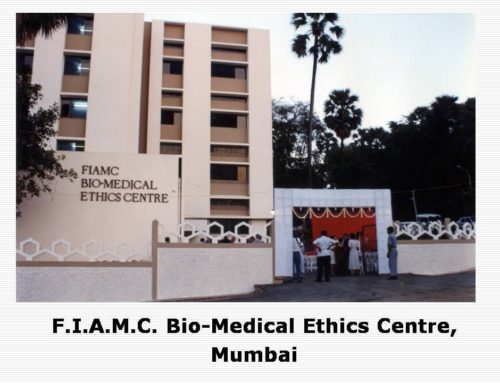The mission of the health care worker is to heal, and who would question if we pepper this mission with some mercy and compassion? However the question is whether mercy is just a welcome icing on the cake or an intrinsic element of the mission of healing.
In our mental maps, mercy is confusedly fused with love, packed under the matters of the heart (versus the matters of science that doctors are supposed to apply) and somewhat difficult to associate with justice, when not diametrically opposed.
To illustrate the popular understanding of the mutual exclusion of mercy and justice we may think of a district judge judging a criminal. If the judge wants to be just, he should apply the law and thus punish the offender accordingly; but the more he wants to be merciful, the more he should forgive him and thus fail to apply the law. So, since that waiving of the law would be manifestly unjust, we have here an understanding of justice and mercy that is mutually incompatible. The more merciful he wants to be, the more unfair he would become. So, judges should be blindly fair and park their mercy at the entrance of the court room lest their mercy towards the criminal would turn into an injustice towards the offended party.
Fortunately physicians don’t find themselves in such a merciless predicament. And however, it is that very understanding of mercy that implies that mercy is only a nice but optional quality to have in health care.
Theologian H. U. v. Balthasar pointed out that in St. Thomas Aquinas justice is just a more concrete form of love. The same we could say about mercy; it is just a concrete form of love. Thomas Aquinas explained that love is to give goodness; justice is to give the goodness that is due to others; and mercy is to give goodness “to remove defects” (deffectum expellunt I, q. 20, a. 3). Mercy, so viewed, is simply restorative love while justice would be the necessary minimum love.
Now the goal of medicine is precisely to restore the body from defects, to bring the person back to health. Medicine is then just a kind of mercy, the mercy for the person’s body, a genuine corporal work of mercy. This means that while can have mercy without medicine, we cannot have medicine without mercy.
The difference between sickness and fault or sin is that while we are manifestly only victims of the failings of our bodies in sickness, in the case of sin, we are both victims and victimizers. Thus complete mercy towards the sinner involves the restoration of the agent’s will to its proper goodness, and that is precisely the main role of discipline and punishment. Mercy that ignores the crime or waives justice and pretends that nothing has happened is not real mercy; it is indeed a kind of cruelty towards the victims.
Pope Francis makes this point very clear in his document on mercy Misericordiae vultus: “This is why God goes beyond justice with his mercy and forgiveness. Yet this does not mean that justice should be devalued or rendered superfluous. On the contrary: anyone who makes a mistake must pay the price. However, this is just the beginning of conversion, not its end, because one begins to feel the tenderness and mercy of God.” (Misericordia vultus, 21)
The other myopic view of mercy is that is an exclusive business of the heart, an emotion or feeling. And this is true, but not the whole truth. The latin word for mercy is misericordiam. Etymologically, this means the misery of the heart. And that refers to the spontaneous emotional reaction we have to other’s misery. It must be noted that this is a natural and spontaneous reaction. While the absence of this capacity is a concern (i.e., in psychopaths), its presence is to be naturally presupposed and thus is not praiseworthy in itself.
Our souls are designed then to mirror the other’s experience: be this happiness or misery. From this point of view, emotional mercy is simply a kind of affliction and pity for the other. But do we want to be pitied upon? Isn’t pity just another bitter reminder on how bad our situation is and how alone we are in our experience?
But St. Thomas does not consider mercy simply an emotion but a virtue, concretely the most excellent of God’s virtues for us. So much so that, inspired in a liturgical prayer of the Church, St. Thomas considers God’s mercy the main expression of God’s power, as Pope Francis reminds us in Misericordiae vultus.
We understand then that the healing ministry of Jesus was not a simple strategic campaign to be popular. Healing, exorcising, forgiving and teaching are the main acts of his ministry because they are acts of mercy that remove defects and because Jesus is God on earth and has to do the works of mercy that reveal best the power of his Father.
While mercy is stirred by the feeling of mercy towards others miseries; it does not stop there, it needs to involve our will to commit ourselves to put a remedy to such misery. But as virtue, mercy cannot stop simply in a voluntary decision or even a long term commitment. A virtue is an acquired disposition, a kind of skill that we need to learn.
Just like no one can save himself to save from drowning by a sheer act of willing to swim unless he has previously acquired the skill of swimming, so no one could expect to be truly merciful unless he has acquired the skill to respond to others misery. Virtue needs emotional and intellectual integration that we need to acquire through practice. A fire-fighter and a soldier must learn to put together knowledge and courage. Likewise a doctor must put together the virtue of mercy or compassion and the science of medicine. One without the other will fail to be truly compassion or truly medicine. Science without compassion would degrade medicine into bioengineering and compassion without the know-hows of medicine would fail to attain its goal of restoring the sick to health.
The virtue of mercy or compassion is then an empowerment necessary for medicine that can draw its energy from the Divine Physician who used his healing powers as the epiphany of God and this is what makes the Health care worker a true minister of God’s mercy in the world.
Fr David Garcia
Spiritual Director
Catholic Medical Guild of Singapore










